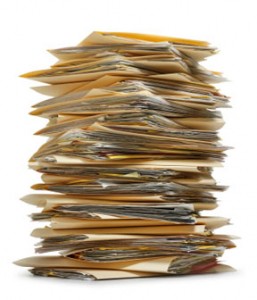 Yes you can. A recent advisory opinion from Nebraska addressed this issue, and concluded that “given the impact of technology on how files can be retained, it is not reasonable or practical to keep physical/paper copies of every client file.” See Neb. Ethics Adv. Op. for Lawyers No. 17-02 at 3089 (Aug. 2017). Thus, nothing prohibits a lawyer from “keeping a closed client file in electronic form and immediately destroying the physical copy.” Id. at 3089.
Yes you can. A recent advisory opinion from Nebraska addressed this issue, and concluded that “given the impact of technology on how files can be retained, it is not reasonable or practical to keep physical/paper copies of every client file.” See Neb. Ethics Adv. Op. for Lawyers No. 17-02 at 3089 (Aug. 2017). Thus, nothing prohibits a lawyer from “keeping a closed client file in electronic form and immediately destroying the physical copy.” Id. at 3089.
The Louisiana Revised Statutes likewise permit a Louisiana lawyer to maintain copies of past (and present) client records solely in electronic format. After digital imaging, a lawyer may “dispose of the original record,” unless the record relates to a claim or report due to the State of Louisiana. See La. Rev. Stat. § 13:3733(A). An electronically-imaged document “shall be deemed to be an original record for all purposes and shall be treated as an original record in all courts or administrative agencies for the purpose of its admissibility in evidence.” See id. § 13:3733(B).1
Prior to making a decision to destroy or to electronically image client documents, a lawyer must make reasonable efforts to assure that the subject documents are eligible for destruction or imaging. The Nebraska opinion advises that a lawyer should consider the following factors in deciding which paper files to destroy:
- the availability and cost of physical and electronic storage space;
- the ease of access to documents;
- the potential need for originals in future litigation; and,
- the need to preserve confidentiality.
Id. at 3092. In most instances, a lawyer need not review each individual document. Rather, the lawyer can simply review broad categories of folders or boxes under consideration for destruction. However, the extent and nature of a lawyer’s predestruction review efforts will turn on the nature of the lawyer’s practice and the documents in issue.
How Long Must You Keep Closed Files?
If you store your files electronically, it is virtually costless to keep them forever. So, you probably should. But if you want to occasionally purge your paper and electronic files, two standards inform the answer to the “how long should I keep them” question. Louisiana Rule 1.15(a) provides as follows with regard to trust account documents:
A lawyer shall hold property of clients or third persons that is in a lawyer’s possession in connection with a representation separate from the lawyer’s own property. Funds shall be kept in a separate account maintained in a bank or similar institution in the state where the lawyer’s office is situated, or elsewhere with the consent of the client or third person. . . . Complete records of such account funds and other property shall be kept by the lawyer and shall be preserved for a period of five years after termination of the representation.
Furthermore, Louisiana Civil Code Article 3496, provides that “[a]n action by a client against an attorney for the return of papers delivered to him for purposes of a law suit is subject to a liberative prescription of three years. This prescription commences to run from the rendition of a final judgment in the law suit or the termination of the attorney-client relationship.”
Given these standards, a good rule of thumb is to keep client files for five (5) years following termination of the matter, unless there is a good reason for maintaining the file for a longer period of time. Such a good reason would exist if the file relates to unprescribed claims, to a minor, or if the file contains promissory notes, wills, trusts or similar “original” documents.
Model Engagement Agreement Provision
To avoid any confusion regarding the destruction of closed files, a lawyer should address the issue in the lawyer’s client engagement agreement. Here is some recommended language for a paperless lawyer:
Lawyer will scan and store all Client files in electronic PDF format and destroy all hard-copy (paper) files given to or received by Lawyer immediately after scanning. All files will be stored “in the cloud” using widely-used providers such as SugarSync and Dropbox. Lawyer and Client understand that there are risks to confidentiality associated with this means of data/document storage. Lawyer will store at Lawyer’s expense all relevant PDF files relating to Matter for a period of up to five (5) years following termination of Lawyer’s representation. Lawyer may thereafter destroy all of Client’s files without further notice to Client. Client may request in writing that Lawyer make available to Client or the Client’s designee any PDF files in Lawyer’s possession that have not been destroyed. Within seven (7) days of receipt of such request, Lawyer shall make electronic (not hard-copy) files available for download.
- The ABA is in accord, advising that lawyer records “may be maintained by electronic, photographic, or other media provided that . . . printed copies can be produced” and that the records are “readily accessible to the lawyer.” See ABA Model Rules for Client Trust Account Records r. 3 (Aug. 9, 2010). ↵
